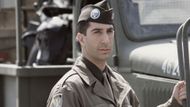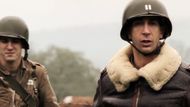The esteemed HBO miniseries Band of Brothers set a high standard for historical drama in 2001. The show is based its narrative on Stephen E. Ambrose’s book. The book recounts the experiences of Easy Company during World War II. The first episode immediately introduces Captain Sobel, played memorably by actor David Schwimmer. Viewers quickly learn to dislike him. They see him as a cruel, petty officer focused on discipline rather than morale.
The question remains whether the show captured the entirety of the real man. The answer is that the show accurately captured his role as a relentless trainer, but it omitted his later combat accomplishments and his private tragedy.
Band of Brothers: Captain Sobel's character, explored

The antagonist of Toccoa
The portrayal of Captain Sobel as the ruthless drill instructor is largely accurate. He was indeed responsible for turning the green recruits into the elite paratroopers of Easy Company. The show accurately depicts his relentless training regimen at Camp Toccoa, Georgia. He required the men to run the unforgiving mountain, Currahee, repeatedly.
Many veterans later confirmed that Sobel’s training was intentionally harsh and exhausting. He often demanded unreasonable standards. He consistently canceled weekend passes for minor infractions like dusty rifle sights. This severe, arbitrary discipline unified the men in their hatred for him. This shared dislike created the intense internal cohesion for which Easy Company became famous.
The trainer’s foundational success
The Band of Brothers miniseries correctly includes a crucial balancing point. Major Dick Winters, who served as Sobel’s executive officer, later paid tribute to his training. Winters wrote that the company's discipline and teamwork "began with Captain Sobel at Camp Toccoa."
Other veterans also credited Sobel for their survival. Paratrooper Donald Malarkey wrote that he later wondered if Sobel was a large reason some of them were still alive. Many soldiers confirmed that Sobel pushed them harder than any other unit commander. They freely admitted that his extreme physical demands made them the most prepared company in the 506th Parachute Infantry Regiment.
The field's incompetence

The miniseries did not invent the complaints about Sobel’s field abilities. His tactical shortcomings became clearly apparent when Easy Company transferred to Camp Mackall. Veterans confirmed that Sobel struggled significantly with map reading and land navigation during training exercises. He reportedly became easily flustered under pressure. Many non-commissioned officers (NCOs) feared he would get them needlessly killed in combat.
These genuine concerns led to the famous mass resignation of NCOs in England in late 1943. Colonel Robert Sink, the regimental commander, resolved this confrontation by removing Sobel from command of Easy Company. He reassigned Sobel to command an airborne school instead. This decision meant Band of Brothers would not enter combat with the officer who trained them.
Omissions: Combat and logistics
The dramatization uses Sobel as an antagonist and largely ignores his continued service and accomplishments. Band of Brothers does not include several important facts about his subsequent war service. He did, in fact, parachute into Normandy on D-Day with the regiment’s Service Company. Upon landing, he immediately assembled four men and destroyed a German machine gun nest. This action earned him the Combat Infantryman Badge.
He spent the remainder of the war as a capable staff officer. He served the regiment as the S-4, the critical logistics officer, in 1945. These later roles required organizational competence and contributed directly to the regiment’s success. The narrative choice of Band of Brothers focused only on his antagonist role, omitting these positive combat and administrative actions.
Omissions: The private tragedy
The real Captain Sobel lived a long life after the war. The show omits the complicated tragedy of his post-military years. He returned to Chicago. He married and raised three sons. He retired from the Army Reserve as a Lieutenant Colonel.
His personal life suffered a severe crisis in 1970. He attempted suicide by shooting himself, which left him permanently blind. For the final seventeen years of his life, he lived in a poorly maintained Veterans Affairs nursing home in Illinois.
He eventually died in 1987. His former men continually invited him to company reunions. He never attended, deepening his isolation. The miniseries chose not to delve into these profoundly human details.
